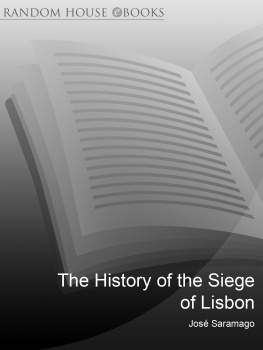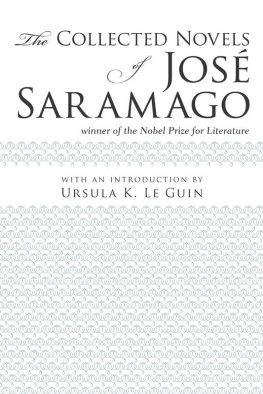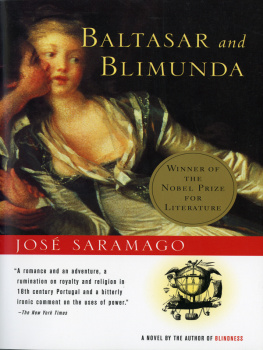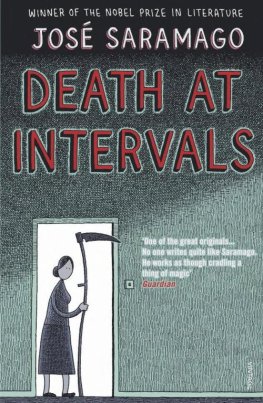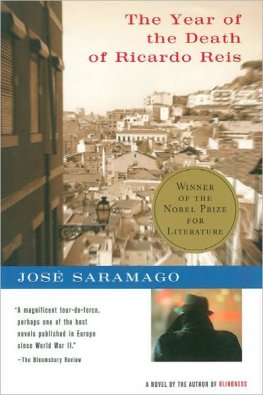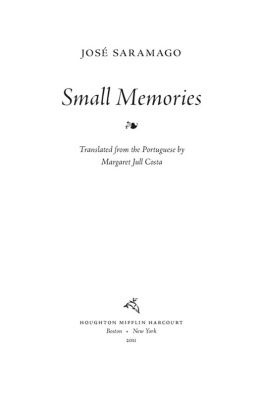In memory of Jernimo Hilrio, my grandfather
In all souls, as in all houses, beyond the faade lies a hidden interior.
RAUL BRANDO
The Book Lost and Found in Time
Saramago was shaving when the phone rang. He held the receiver to the unsoaped side of his face and said, Really? How amazing. No, dont bother. Ill be there in about half an hour. And he hung up. I had never known him to take a shower so quickly. Then he told me that he was going to collect a novel he wrote in the 1940s or 1950s and which had been lost ever since. When he returned, he had under his arm Clarabia (Skylight), or, rather, a bundle of typewritten pages, which had somehow not grown yellow or worn with time, as if time had proved more respectful of the original than the people to whom it was sent in 1953. It would be a great honor for us to publish this manuscript, which we found when we moved offices, they said graciously in 1989, when Jos Saramago was working hard on finishing The Gospel According to Jesus Christ. Thank you, but no, he said and left, taking with him the rediscovered novel and having finally received an answer that had been denied to him thirty-six years before, when he was thirty-one and still full of dreams. Being ignored by that publishing house had plunged him into a painful, indelible silence that lasted decades.
The book lost and found in time is how we used to refer to Skylight at home. Those of us who read the novel tried to persuade its author to publish it, but Saramago stubbornly refused, saying that it would not be published during his lifetime. His sole explanation his main principle of life, often spoken and often written was this: no one has an obligation to love anyone else, but we are all under an obligation to respect each other. According to this logic, Saramago considered that while a publishing house is clearly under no obligation to publish every manuscript it receives, it does have a duty to respond to the person waiting impatiently and even anxiously day after day, month after month. After all, the book a writer submits in the form of a typescript is much more than just a collection of words; it carries within it a human being, with all his or her intelligence and sensibility. It occurred to us that perhaps each time Saramago saw a copy in print, it would be like reliving the humiliation of not receiving so much as a few short lines even a brief, formal we currently accept no submissionsand so we, his friends and family, did not insist. We likewise attributed to that ancient grief the fact that he simply left the typescript on his desk to languish among all his other papers. Jos Saramago did not reread Skylight and did not miss it when I carried it off to have it bound in leather; when I presented him with the bound edition, he said I was being over the top, extravagant. And yet he knew because he was the author that the book was certainly not a bad one, that it contained themes that recurred in his later novels, and that in its pages one could already hear the narrative voice he would go on to develop more fully.
But there is another way of speaking of all this, as Saramago would say when he had crossed deserts and navigated dark waters. If, after presenting all these facts and suppositions, we accept that statement, then we must interpret all the various signs and his apparent obstinacy in the light of a whole life marked by a pressing need to share and communicate. Dying means that we were and no longer are, said Saramago. And its true that he died and is no longer here, but suddenly, in the countries where Skylight has been published, in Portugal and Brazil, the countries that speak his language, people are talking excitedly about this new book. Yes, Saramago has actually brought out a new book, a fresh, illuminating work that touches our hearts and elicits cries of joy and astonishment, and then we realize that this is the gift the author wanted to leave to us so that he could continue to share his words with us now that hes no longer here. People keep saying: this book is a real gem; it contains all his later literary obsessions; its like a map of the work to come; how could such a young man have written with such maturity, such confidence? Yes, that is the question his readers keep asking. Where did Saramago get his wisdom from, his ability to portray characters with such subtlety and economy, to reveal the profundity and universality of the most banal situations, to trample on convention in such a serenely violent way? This is a young man, remember, who had never been to university, the son and grandson of illiterates, a mechanic by trade and, at the time, an office worker, daring to take on the cosmos of an apartment building and its inhabitants, guided only by his own instincts and in the enjoyable company of Pessoa, Shakespeare, Ea de Queiroz, Diderot and Beethoven. This is our entry into Saramagos universe, which is already clearly delineated here.
In Skylight we find the prototypes of some of Saramagos male characters: the man known simply as H in Manual of Painting and Calligraphy, Ricardo Reis in The Year of the Death of Ricardo Reis, Raimundo Silva in The History of the Siege of Lisbon, Senhor Jos in All the Names, the cellist in Death with Interruptions, Cain, Jesus Christ, Cipriano Algor that whole tribe of silent men, free, solitary beings who need to find love in order, however briefly, to break out of their focused, introverted way of being in the world.
In Skylight we also find some of Saramagos characteristically strong women. His treatment of them is even more unconventional: Ldia, for example, is a kept woman who gives lessons in dignity to her businessman lover; lesbian love is treated with remarkable frankness, as are the inherited submissiveness handed down within families, the fear of what others might say, rape, blind instinct, the struggle for power, narrow lives lived honestly despite straitened circumstances and sundry misfortunes.
Skylight is a novel of characters. It is set in the Lisbon of the early 1950s, when the Second World War has ended, but not the Salazar dictatorship, which hangs over everything like a shadow or a silence. It is not a political novel, and we should not, therefore, necessarily conclude that the reason it remained unpublished was because it fell victim to the censors. And yet, given the prudish times in which it was written, its content must have had some bearing on that decision not to publish. The novel rejects established values: the family is not a symbol of hearth and home, but of hell; appearances count for more than reality; apparently praiseworthy utopian dreams are revealed for the hollow things they really are. It is a novel that explicitly condemns the mistreatment of women, but treats love between two people of the same sex as natural, albeit, in the circumstances, anguishing. Coming from an unknown author, such a strong-minded book would have taken a lot of defending for very little reward. That is probably why the book was relegated to a drawer, without a firm yes or no. Perhaps and again we are conjecturing they put it off until later on, when times would have changed, never imagining that it would take decades for any so-called liberalization to begin to make its mark, and meanwhile, in both the world and the publishing house, generations passed and any such good intentions were left to molder in a drawer along with the typescript. Saramago, by then, had a new profession, that of editor. Having made his journey through silence and solitude, he was preparing to write other books.
Life was not easy for Saramago. Not only was his book ignored by the publishers a book written at night, after days spent engaged in unrewarding tasks he was ignored too, because he was unknown, had no university education, and wasnt one of the intellectual elite, all of which were important factors in the small world of 1950s and 60s Lisbon society. Those who later became his colleagues made fun of him because he stammered, and his stammer, which he eventually managed to overcome, made him rather withdrawn; he let others do the talking while he watched, living very much in his own inner world, which is perhaps why he was able to write so much. After



